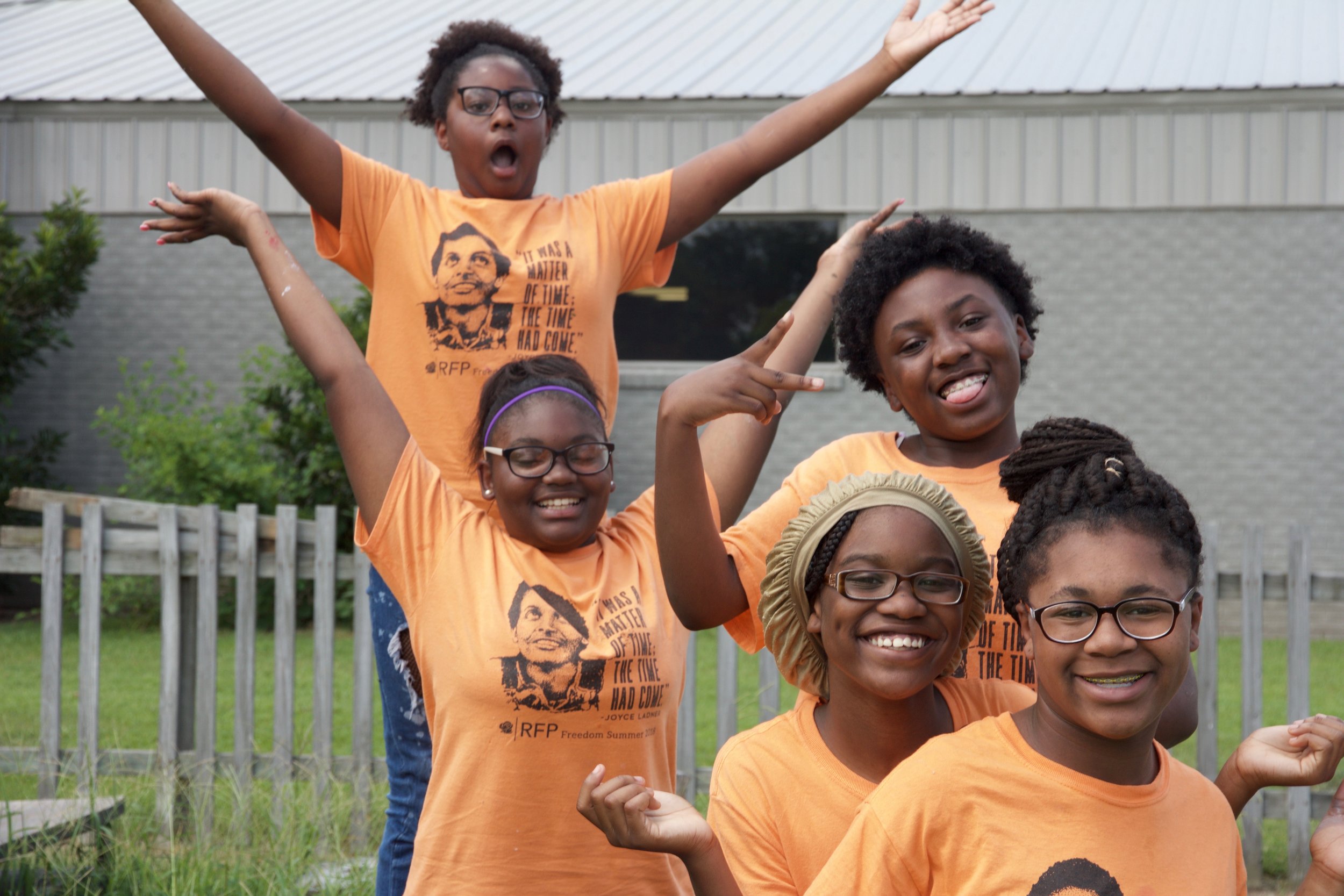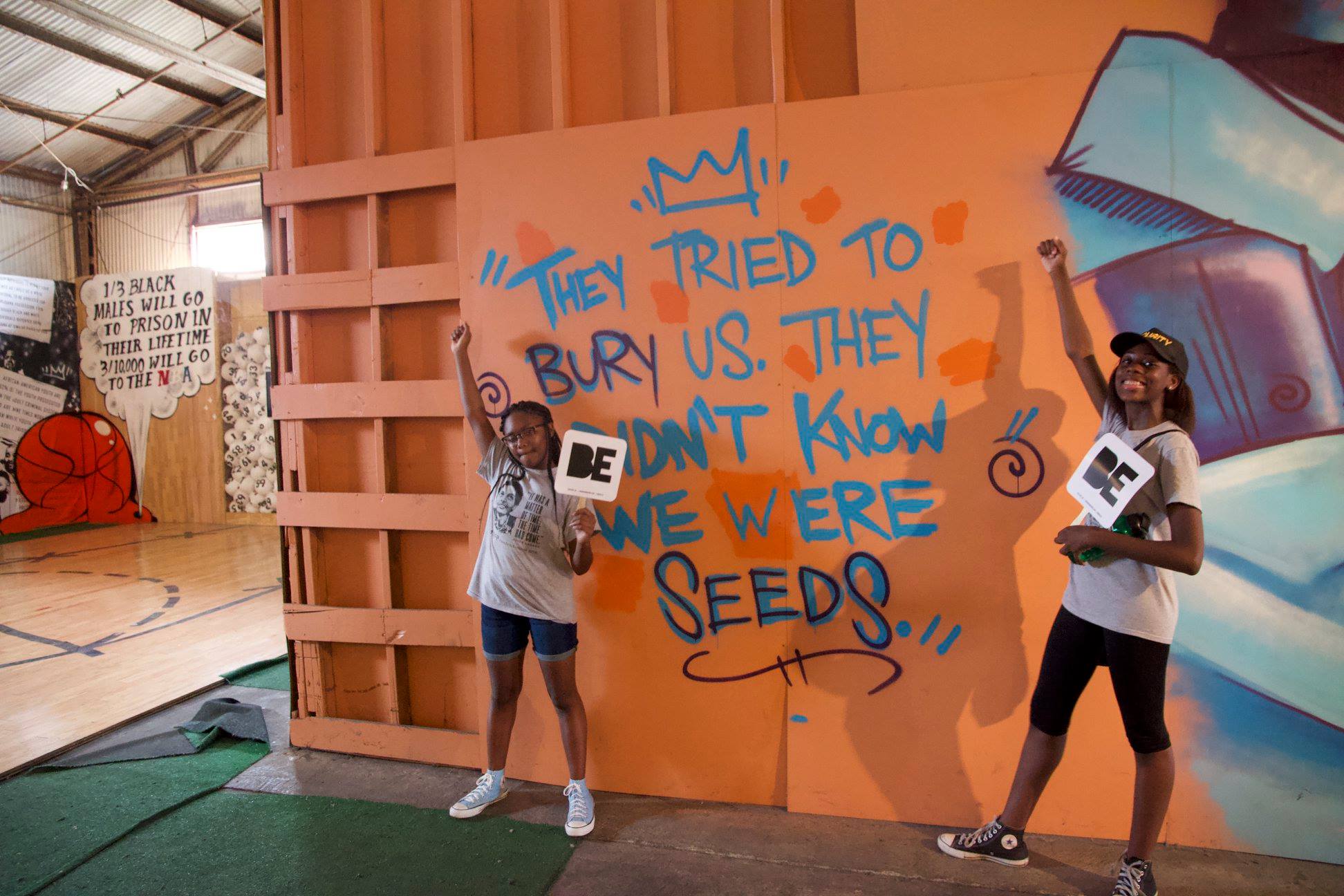In 2014, a small group of teachers, parents, and young people in Rosedale began holding house meetings to discuss the state of education in our community. Over the course of the next six months, the group met regularly to discuss low ACT scores, graduation rates, and college matriculation rates. Students discussed how they felt frustrated and disappointed that so little was being invested in their education. Adult family members pointed out how rarely the school communicated with them about these issues and about their child’s progress in their classes. Educators talked about the lack of support they received from the district and the state.
One of the organizers, a teacher at the high school, had heard of a program that was supporting young people outside of the school day through arts, academic support, educational travel, and civil rights education. The group decided to visit the Sunflower County Freedom Project, an hour's drive from Rosedale. There, they met high school students who were involved in theater, creative writing, spoken word poetry, and visual arts. These young people spoke to them about the trips they had taken camping, touring civil rights monuments, and visiting cities around the country.
Determined to start such a program in Rosedale, the group returned and began organizing the Rosedale Community Youth Center - what is today the Rosedale Freedom Project (RFP).
In its first two years, the organization did not have the resources to hire staff members. Instead, volunteer teachers, parents, and community members held reading, math, and arts classes over the summer. After school, they held photography and oral history classes, and students in the program, known as Freedom Fellows, assembled a 30-minute documentary about the history of education in Rosedale. They interviewed grandparents, former educators, and current students about their experiences at school. In the spring of 2017, two freedom fellows and two educators brought their art to Chicago. During that trip, they met young people doing restorative justice circles in Chicago public schools. They sat in on these circles and learned from young people how they were shifting culture and interrupting the criminalization of black youth in their schools.
During the next summer, the RFP began integrating Restorative Justice practices into our program. Students and adults alike were trained in practices such as community building circles, peace building circles, and mediations. These practices have remained essential components of the freedom fellowship alongside the transformative justice work that we continue to develop.
That summer, the Rosedale Freedom Project also began partnering with Freedom Summer Collegiate, a program that recruits and places doctoral students in youth programs in Mississippi and Arkansas to teach courses designed around their disciplines. High school students who complete these courses receive college credit and explore topics that extend far beyond the scope of their school curricula.
The next year, the Freedom Project was finally able to attain funding to hire staff members: One full-time staff member, one part-time staff member, and one AmeriCorps VISTA service member. That year, the Freedom Project also launched its creative writing and filmmaking programs, both of which have become mainstays at the RFP.
Since becoming a year-round program, Freedom Fellows have won paid contracts to make documentary films; scripted, directed, and acted in more than 15 original short films and music videos; produced, published and sold three literary zines; trained hundred of educators across the Mississippi/Arkansas Delta; built and planted a garden; traveled across nine states; and gone on to attend colleges and universities across the state with support from our Alumni College Success Program, which provides financial, academic, and socio-emotional support to Fellows during their college tenure.
Along the way, the Rosedale Freedom Project has also served as a resource hub for the community, including acting as a food distribution site at the onset of the COVID-19 pandemic, supporting community members in completing the state’s Emergency Rental Assistance Program application, and registering voters in Rosedale and the surrounding communities.
Over the years, however, the most transformative work being done by fellows and families has been our collective effort to transform education in Rosedale more broadly. While we have been able to create liberatory educational spaces centered on transformative justice at our program, we have seen again and again the limitations of this effort. As long as young people are dealing with deprivations and hostility during their school day, we will not have realized educational justice in Rosedale.
From our first oral history project to Fellows’ later efforts to advocate at the state and federal level, fellows and families have consistently identified the need to organize for better schools. Now, conditions only underscore this necessity. Chronic understaffing and underfunding of schools, The lack of social and emotional supports for young people, the ongoing trauma of the COVID-19 pandemic, and the increasing hostility of state officials towards truth telling about systems of oppression in classrooms all threaten the well-being of our young people. Continuing to hold space for students to envision liberation through art, discover the world and themselves through learning, and build community with one another through dialogue remains vital. Yet we must also advance our mission beyond the four walls of the Freedom Project and do the difficult work of transforming education in Rosedale.








